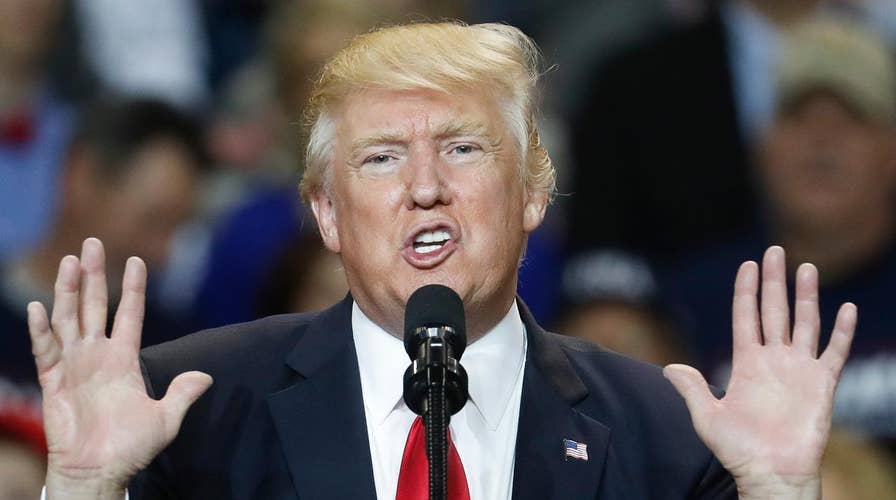President Trump said Friday the White House “learned a lot about loyalty and the vote-getting process” following the dramatic failure of a Republican-backed bill that would have made good on a campaign promise to repeal and replace ObamaCare.
Trump said House Republicans were 10 to 15 votes shy of getting the bill passed and blamed the defeat on Democrats. House Speaker Paul Ryan pulled the bill minutes before a vote was to take place as it became apparent there was not enough support for passage. Democrats were united against it, and a conservative bloc of Republicans were unmoved by 11th-hour negotiations.
“We had no Democratic support,” Trump said from the Oval Office. “They weren’t going to give us a single vote.”
The president added that the “best thing we can do, politically speaking, is let ObamaCare explode. It’s exploding right now… Almost all states have big problems.”
Trump claimed he never said he would “repeal and replace [ObamaCare] within 64 days,” though he repeatedly promised during the campaign he’d do it on Day One.
Ryan, R-Wis., withdrew the legislation after Trump called and asked him to halt debate without a vote.
“We came really close today but we came up short,” Ryan said. He added that Friday’s developments were “not the end of the story” though he immediately pivoted to other items on the GOP agenda, including tax reform.
“We have big, ambitious plans to improve people’s lives,” he said.
Ryan made the walk to the White House shortly after noon to tell the president he lacked the votes to push the bill through. Friday marks the seventh anniversary of the signing of the Affordable Care Act by former President Barack Obama.
The GOP bill would have replaced ObamaCare, which mandated that almost every American have health insurance.
“This was a rejection of the repeal of the Affordable Care Act,” Democratic National Committee chair Tom Perez said in a written statement. “In the words of my friend Joe Biden: This is a BFD.”
House Minority Leader Nancy Pelosi, D-Calif., called the failed GOP health care bill a “victory for the American people.”
Republicans have spent seven years campaigning against Obama's signature health care law, and cast dozens of votes to repeal it in full or in part. But when they finally got the chance to pass a repeal bill that actually had a chance to get signed, they couldn't pull it off.
What happens next is unclear, but the path ahead on other priorities, such as overhauling the tax code, could grow more daunting.
The development came on the afternoon of a day when the bill, which had been delayed a day earlier, was supposed to come to a vote, come what may. President Trump's top aides had told Ryan to call a vote - and possibly call the bluff of balky Republicans in the House Freedom Caucus.
But instead of picking up support as Friday wore on, the bill went the other direction, with some key lawmakers coming out in opposition.
Rep. Rodney Frelinghuysen, R-N.J., chairman of the powerful Appropriations Committee, said the bill would raise costs unacceptably on his constituents. Rep. Barbara Comstock of Virginia, a key moderate Republican, and GOP Rep. David Joyce of Ohio also announced "no" votes.
The defections raised the possibility that the bill would not only lose on the floor, but lose big.
In the face of that evidence, and despite insistences from White House officials and Ryan that Friday was the day to vote, leadership pulled back from the brink.
The GOP bill would have eliminated the Obama statute's unpopular fines on people who do not obtain coverage and would also have removed the often-generous subsidies for those who purchase insurance.
Republican tax credits would have been based on age, not income like Obama's, and the tax boosts Obama imposed on higher-earning people and health care companies would have been repealed. The bill would have ended Obama's Medicaid expansion and trimmed future federal financing for the federal-state program, letting states impose work requirements on some of the 70 million beneficiaries.
The nonpartisan Congressional Budget Office said the Republican bill would have resulted in 24 million additional uninsured people in a decade and lead to higher out-of-pocket medical costs for many lower-income and people just shy of age 65 when they would become eligible for Medicare. The bill would have blocked federal payments for a year to Planned Parenthood.
Democrats were uniformly opposed. "This bill is pure greed, and real people will suffer and die from it," said Rep. Pramila Jayapal of Washington state.
Fox News' Chad Pergram, John Roberts, Jennifer Bowman and The Associated Press contributed to this report.













































